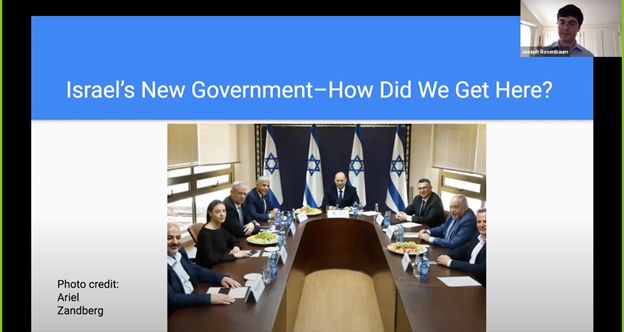Undergraduate Presents Research on Israeli Elections at UCLA Conference

This summer, rising junior Joseph Rosenbaum received the opportunity to present his research at an undergraduate conference for the first time. The Political Science and Music Performance double-major first wrote his paper, titled “Musical Chairs in the Knesset: The Bader-Ofer Method,” for Professor Geoffrey Levin’s Fall 2020 course, “Israeli Politics.” The 2020-21 academic year was Prof. Levin’s first at Emory, where he holds a joint appointment in the Tam Institute for Jewish Studies and the Department of Middle Eastern & South Asian Studies. For the course, students completed not only short and long-form essays like the one Rosenbaum wrote, but also a group project meant to simulate coalition-building among political parties via the creation of their own original campaign ad. Rosenbaum chose the course based on his ongoing interest in Israeli politics and looked forward to taking a class on this topic for the first time in his academic career.
"Joseph's appreciation for the 'nuts and bolts' of the political mechanisms at play in the Israeli electoral system really stood out to me,” says Levin. “I thought that political scientists would be very interested in his research paper, so I encouraged him to submit it for the conference at UCLA.” Rosenbaum heeded his advice and submitted an abstract to the Undergraduate Scholars Conference in Israel Studies, where it was accepted. Hosted by the UCLA’s Nazarian Center for Israel Studies and now in its third year, the conference allows undergraduate students to present and discuss their research on modern Israel in any academic discipline. As it was hosted virtually this year, young scholars from all over the U.S. and some international locations were able to come together to share their work.
Rosenbaum’s presentation focused on the role of one specific electoral procedure in Israel’s legislative body, the Knesset. “Israel has gone through four elections in a row and it’s been pretty tumultuous,” he explains. “There are plenty of reasons for that, but one of the influencing factors that tends to be overlooked is the Bader-Ofer Method, which is an algorithm for distributing Knesset seats after elections.” Rosenbaum explained to his listeners the history of previous methods for distributing Knesset seat, and then detailed how the Bader-Ofer Method works and gave examples of its impact on the last election.
Given the narrow, one-seat edge that allowed the parties in the current government to forge a coalition, explains Rosenbaum, “Bader-Ofer very much made the difference in not only whether a government was formed, but who go to be in the government.”
Though it was his first time participating in an undergraduate research conference, Rosenbaum hopes to be able to do so again in the future in preparation for his postgraduate plans—applying to a Ph.D. program in Political Science. Congratulations to Joseph for this achievement!
You can view a recording of the presentation here.
Published 8/13/21